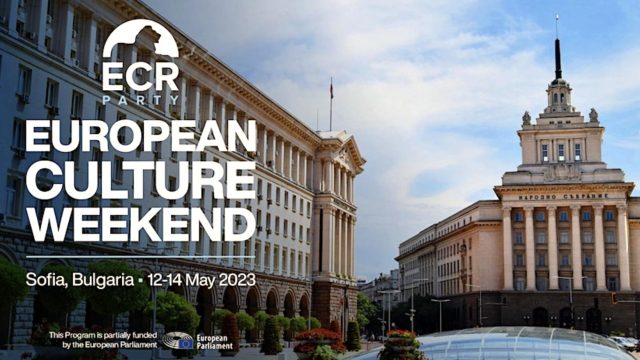
After the success of the Split conference, the European Culture Weekend series of events organised by the European Conservative Party (ECR Party) will continue in Sofia, the capital of Bulgaria.
The conference, which will take place on the 12th-14th of May 2023, will be attended by speakers from the European Conservative family, including MEPs of the European Conservatives in the European Parliament, party leaders, academics, journalists, international experts and more. All those mentioned will have important information to share for young conservatives attending the conference and beyond. They will share their political experience and answer questions from the audience.
As on other occasions, the organisers promise a full experience in which guest speeches will be combined with outstanding social activities and promise to form new links and strengthen old ties between European conservatives in different countries.
For the weekend of May 12-14, the European Conservatives have proposed a cultural theme for debate, as given by the name of the conference: “European Culture Weekend”. To this end, ECR Party is offering participants a guided tour from the very first day of the conference, giving them the opportunity to experience the history and culture of Bulgaria’s capital, Sofia.
The first sight that will be visited during this historical-cultural tour is the memorial to the victims of the communist regime, a regime that has taken many lives in Eastern Europe.
Here, participants will be guided by Dr. Milen Mihov (associate professor of Bulgarian history, former assistant rector of the University of Veliko Tarnovo “St. Cyril and Methodius”). The second tourist attraction that will be presented to the participants of the conference is the Cathedral “Sveta Nedelya”. It is known that the Cathedral of Sveta Nedelya in Sofia is dedicated to the holy muceness Chiriachi. Bulgarians know it as Holy Sunday because kiriaki, in Greek, translates as “Sunday/ Lord’s Day”, and the Bulgarian translation for Sunday is “nedelya”.
Why is this Orthodox cathedral, built since the 18th century, so important for the history of Bulgaria’s capital? The Supreme Court of Appeal in Sofia banned the Bulgarian Communist Party in 1923. However, Bulgarian communist sympathisers, financed by the Soviet Union, tried to turn Bulgaria into a Bolshevik state and at the same time, an ally of Moscow in the heart of the Balkans.
In order for the plans of the Bulgarian communists to achieve their goal, on April 14, 1925 (it was the Tuesday of Holy Week), General Konstantin Gheorghiev was killed with several revolver shots by the communist terrorist Atanas Todovicin in front of the “Sveti Sedmocisleniți” Cathedral. The general’s funeral took place on Maundy Thursday in Sveta Nedelea Cathedral. The Communists placed 25 kg of explosives in small packages in the attic of the church, next to the main dome column of the church at the entrance to the church. At 3.20 p.m., as the funeral service began and Bishop Stephen of Sofia was reading the Gospel, the explosives were detonated. This blew up the main dome of the church, which collapsed on top of the people inside, who were attending the service. The bombing killed 134 people in the blast, over 500 people were injured and a further 79 people later died in hospital, bringing the total number of casualties to 213. As if by magic, members of the government survived the massacre and the main target of the bombing, 31-year-old Tsar Boris of Bulgaria, was not in the cathedral, being late for the funeral. The rebuilding of St Sunday’s Church would begin in 1927 and it was consecrated in 1933. In 1944 Bulgaria becomes a people’s republic with a single communist party.
The tour continues at the Triangle of Power, the building that houses the National Assembly, the Presidency and the Council of Ministers. Finally, the conservatives attending the conference will visit the “Saint George” church, the “Serdika” ancient complex and the “Ivan Vazov” national theatre.
Friday will end with a welcome dinner hosted at the Grand Hotel Millennium in Sofia, where participants will have the opportunity to socialise and exchange ideas.
The most important part of the conference will take place on Saturday the 13th of May at the National Palace of Culture. Here the speakers and special guests will start the series of speeches with a discussion on the challenges and opportunities ahead for European conservatives. The conference agenda will continue with a very important topic, namely disinformation and misinformation as a political tool in the hands of those who embrace woke ideology. After lunch, the lecture series will continue with views on localism as a conservative ideal and discussions on European culture and identity, a priority on the agenda of European conservatives.
As a final key point to be discussed at the ECR Party event is the long-term plan for support to Ukraine and Eastern European countries and the prospects for future relations between the European Union and Russia. The conference will end with the conclusions of these lectures, after which participants will have the opportunity to take part in a retro tram ride to the “Lozenetz” Residence. At this location the closing dinner will be hosted where the participants of the European Culture Weekend conference will have the pleasure to taste different Bulgarian culinary dishes. The organizers have also prepared a diverse folklore program inspired by the Bulgarian tradition. During this festive event the guests will have the opportunity to socialize and exchange views on the important topics discussed during the conference.
Surely after this conference those attending the ECR Party’s European Culture Weekend event in Sofia will have a new perspective on the important topics discussed, as well as new ideas worth developing and debating in future European Conservative conferences.



 Subscribe
Subscribe